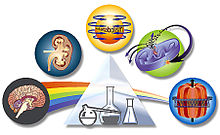Pharmacology/Definition

'Pharmacology' (from Greek φάρμακον, pharmakon, "drug"; and -λογία, -logia, "the study of") is a branch in science concerned with the effects of drugs on living organisms (pharmacodynamics) and the effects of living organisms with drugs (pharmacokinetics). This subject embodies drug composition and properties, interactions, toxicology, therapy, and medicinal uses such as application and antipathogenic capabilities. Pharmacology is subdivided into two categories as mentioned above, pharmacodynamics and pharmacokinetics. Pharmacodynamics deals with chemical interactions with body/cell receptors. Pharmacokinetics, on the other hand, deals with the four stages of chemicals passing through the body: absorption, distribution, metabolism and excretion.
Pharmacology is not to be confused with pharmacy. Pharmacy is a professional field in medicine concerned with preparation and distribution of medicine. Pharmacology is the study of the interaction and effects between chemicals and biological systems and vice versa.
